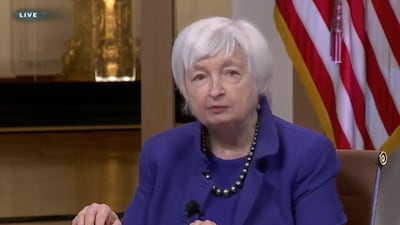US Treasury Secretary Janet Yellen said on Tuesday that she wasn’t forecasting interest rate increases to rein in any inflation spurred by President Joe Biden’s proposed spending, clarifying comments that ruffled financial markets a few hours earlier.
"It's not something I'm predicting or recommending," Ms Yellen, a former Federal Reserve chair, said during an online event hosted by the Wall Street Journal. "If anyone appreciates the independence of the Federal Reserve, I think that person is me."
Ms Yellen said she didn’t anticipate a bout of persistently higher inflation, but that if one occurred the central bank has the tools to deal with it.
The Biden administration has proposed additional long-term spending packages totalling about $4 trillion on top of the $1.9tn it pumped into the economy beginning in March to combat the impact of the Covid-19 pandemic.
Earlier in the day, Ms Yellen caused a set of hiccups in financial markets when she said that “it may be that interest rates will have to rise somewhat to make sure our economy doesn’t overheat”.
"It could cause some very modest increases in interest rates," Ms Yellen said in an interview with the Atlantic recorded on Monday that was broadcast on the web on Tuesday morning.
That was a rare remark on the outlook for interest rates by a cabinet member, who in recent history – aside from the very notable exception of former President Donald Trump and his administration – tended not to veer anywhere close to the Fed’s jurisdiction.
Stocks, which had already been down for the session, slid further after Ms Yellen’s morning remarks, though later pared losses. The S&P 500 ended the day down 0.7 per cent.
Investors aren’t expecting the Fed to boost its policy rate for years to come, and Fed chair Jerome Powell last week underscored it’s not time yet to contemplate paring back on asset purchases. Any hint that a less-easy Fed is on the immediate horizon would have major implications for markets.
Higher rates would also be counterproductive for Mr Biden’s plans – Ms Yellen has repeatedly highlighted how historically low borrowing costs today give the government greater scope to boost spending.
The current administration has been careful to avoid a pattern of commenting directly on Fed policy in the way Mr Trump did, with Mr Biden even saying last month he hadn’t met with Mr Powell, out of respect for the central bank’s independence.
Ms Yellen’s morning comments featured shortly later at the daily White House press briefing, with White House Press Secretary Jen Psaki saying that “Secretary Yellen certainly understands” the Fed’s independence.
Ms Psaki also said that Mr Biden agrees with Ms Yellen, and that “we also take inflationary risk incredibly seriously”.
Tony Fratto, a former White House and Treasury official under President George W. Bush, said via Twitter that “Treasury secretaries shouldn’t talk about the Fed’s policy rate, and Fed governors shouldn’t talk about US dollar policy”.
The comments come amid a debate on whether Mr Biden’s raft of proposed and enacted government spending could spur a surge in price pressures.
Administration and Fed officials both have consistently dismissed concerns over accelerating inflation. They’ve argued that price gains expected this year will be largely transitory, and that the central bank has tools to contain any persistent effects.
“It should not come as a shock that the two very large spending bills being contemplated would push longer-term interest rates higher,” either through stronger economic growth or by changing expectations among investors for when the Fed will raise rates, said Michael Gapen, chief US economist at Barclays. “That’s consistent with what markets would say.”
Mr Gapen said he didn’t think Ms Yellen’s morning comments represented a preference for how the Fed should be managing the impact of government spending.
When Fed officials last issued projections, in March, they forecast no move in interest rates until at least 2024.
Ms Yellen insisted in the Atlantic event that the heavy spending Mr Biden is calling for would provide a net benefit to the economy, even if interest rates do go up.
“These are investments our economy needs to be competitive and to be productive, and I think our economy will grow faster because of them,” Ms Yellen said.

